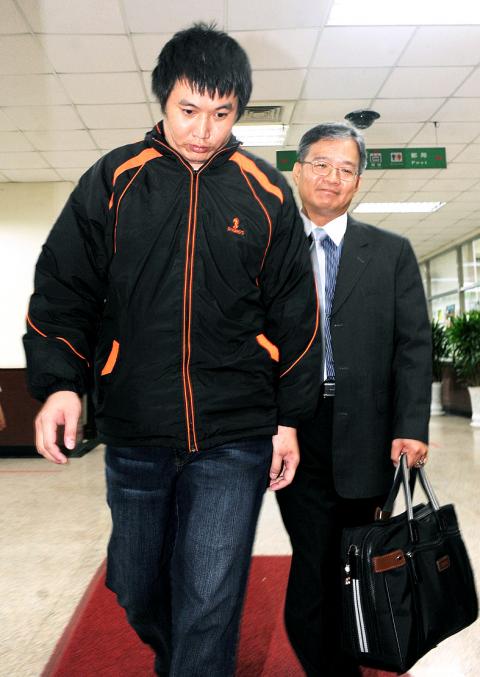The Taiwan High Court yesterday found Hsu Jung-chou (許榮洲) not guilty of the rape and murder of a five-year-old girl in 1996 that had led to the wrongful execution of airman Chiang Kuo-ching (江國慶), and ordered Hsu’s release.
Hsu was charged with the murder by the Taipei District Prosecutors’ Office in May 2011 and that December was sentenced to 18 years in jail by the Taipei District Court.
The High Court’s acquittal left the question of who the real murderer was unanswered.

Photo: Lo Pei-der, Taipei Times
The Taipei District Prosecutors’ Office said it would decide whether to appeal to the Supreme Court once it has read the ruling.
The High Court said Hsu, who is mentally challenged, confessed to the crime on seven occasions, but all the confessions were contradicted by autopsy findings.
The High Court said Hsu’s IQ is between that of a nine and 12-year-old and he has difficulty expressing himself. He cannot write and his initial confession was made to military officials, and was written down by a member of the military who refused to testify during the hearing.
Hsu had confessed to using his fingers to penetrate the victim’s vagina, but the autopsy showed a stick had been used, causing internal injuries. After the youngster died, a knife was inserted through her vagina into her stomach.
The ruling said Hsu left a bloody palm print at the scene of the crime, but no other evidence indicates that he was involved in the crime.
In the first trial, the Taipei District Court ruled that on Sept. 12, 1996, Hsu, who was an airman assigned to the Air Force Command, saw the girl, surnamed Hsieh (謝), watching TV alone at a restaurant at the base. It said he led the girl to a washroom and then took off her clothes before brutally assaulting her and that, to stifle the girl’s cries, he put his hand over her mouth and nose, smothering her.
The case has sparked controversy because the investigation determined that Chiang, who was also serving in the Air Force Command at the time of the incident and was convicted of the crime after a month-long military investigation and was executed the following year, was innocent. Chiang was 21 years old when he was executed.
A military court exonerated Chiang and awarded his family NT$103.18 million (US$3.4 million) in compensation, and filed a lawsuit with the Taipei District Court requiring former minister of national defense Chen Chao-min (陳肇敏), who was then commander of the air force, and other military officials to repay the military for the compensation paid to Chiang’s family.
The military said that its lawsuit to recover the compensation from Chen and others would not be affected by the yesterday’s ruling.
Taipei prosecutors are still investigating whether Chen and seven other military officials had used inappropriate methods to coerce Chiang into confessing.

SECURITY: As China is ‘reshaping’ Hong Kong’s population, Taiwan must raise the eligibility threshold for applications from Hong Kongers, Chiu Chui-cheng said When Hong Kong and Macau citizens apply for residency in Taiwan, it would be under a new category that includes a “national security observation period,” Mainland Affairs Council (MAC) Minister Chiu Chui-cheng (邱垂正) said yesterday. President William Lai (賴清德) on March 13 announced 17 strategies to counter China’s aggression toward Taiwan, including incorporating national security considerations into the review process for residency applications from Hong Kong and Macau citizens. The situation in Hong Kong is constantly changing, Chiu said to media yesterday on the sidelines of the Taipei Technology Run hosted by the Taipei Neihu Technology Park Development Association. With

CARROT AND STICK: While unrelenting in its military threats, China attracted nearly 40,000 Taiwanese to over 400 business events last year Nearly 40,000 Taiwanese last year joined industry events in China, such as conferences and trade fairs, supported by the Chinese government, a study showed yesterday, as Beijing ramps up a charm offensive toward Taipei alongside military pressure. China has long taken a carrot-and-stick approach to Taiwan, threatening it with the prospect of military action while reaching out to those it believes are amenable to Beijing’s point of view. Taiwanese security officials are wary of what they see as Beijing’s influence campaigns to sway public opinion after Taipei and Beijing gradually resumed travel links halted by the COVID-19 pandemic, but the scale of

A US Marine Corps regiment equipped with Naval Strike Missiles (NSM) is set to participate in the upcoming Balikatan 25 exercise in the Luzon Strait, marking the system’s first-ever deployment in the Philippines. US and Philippine officials have separately confirmed that the Navy Marine Expeditionary Ship Interdiction System (NMESIS) — the mobile launch platform for the Naval Strike Missile — would take part in the joint exercise. The missiles are being deployed to “a strategic first island chain chokepoint” in the waters between Taiwan proper and the Philippines, US-based Naval News reported. “The Luzon Strait and Bashi Channel represent a critical access

Pope Francis is be laid to rest on Saturday after lying in state for three days in St Peter’s Basilica, where the faithful are expected to flock to pay their respects to history’s first Latin American pontiff. The cardinals met yesterday in the Vatican’s synod hall to chart the next steps before a conclave begins to choose Francis’ successor, as condolences poured in from around the world. According to current norms, the conclave must begin between May 5 and 10. The cardinals set the funeral for Saturday at 10am in St Peter’s Square, to be celebrated by the dean of the College